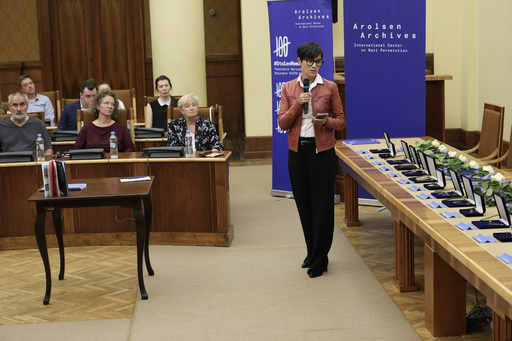In 1944, Stanislawa Wasilewska was captured by Nazi German troops in Warsaw and taken to the Ravensbrück women’s concentration camp at the age of 42. After that, she was transferred to the Neuengamme forced labor camp, where her valuables were confiscated, and she was assigned the prisoner number 7257. Eighty years later, the Arolsen Archives in Germany returned Wasilewska’s jewelry to her grandson and great-granddaughter in a touching ceremony in Warsaw. The event involved 12 Polish inmates’ families receiving back items that had been seized from their relatives during the Nazi concentration camps.
During the ceremony, tears were shed by some family members as they were reunited with the artifacts belonging to their long-departed and often unfamiliar family members. The returning of confiscated belongings was a poignant moment for those present, and more similar ceremonies are planned for the future. Wasilewska’s family received two amber crucifixes, a part of a golden bracelet, and a gold wristwatch engraved with the initials KW and the date 7-3-1938, believed to commemorate her wedding to Konstanty Wasilewski.
Wasilewska’s great-granddaughter, Malgorzata Kory?, 35, expressed the significance of the event, stating that the story had previously been unknown to them and was now coming to light. Wasilewska, after being rescued by the Red Cross from Neuengamme and taken to Sweden, later returned to Poland and was laid to rest in her hometown near Warsaw. Another family, represented by Adam Wierzbicki, 29, received two rings that belonged to Zofia Strusi?ska and a golden chain and tooth filling of Józefa Skórka, two married sisters related to his great-grandfather Stanislaw Wierzbicki, who had also been captured and went through similar camps.
The Arolsen Archives, which holds information on approximately 17.5 million people who faced Nazi persecution, returned the items confiscated from concentration camp inmates from over 30 countries to their descendants. Their restitution campaign, “Warsaw Uprising: 100 Untold Stories,” was initiated to commemorate the 80th anniversary of the city’s uprising against the Nazis to locate the families of the victims and honor their memory through their recovered possessions.
Floriane Azoulay, the director of the archives, emphasized the importance of returning these personal items to the families, stating that each object was significant as it was likely the last personal possession the person had before becoming a prisoner. Volunteers like Manuela Golc have been instrumental in tracing and reuniting these belongings with the families, sometimes by leaving waterproofed notes at gravesites when unable to find them through other means. The Warsaw Uprising, intended to liberate the capital city from the Nazis, resulted in immense sacrifices and losses, with around 200,000 fighters and civilians losing their lives during the 63-day struggle. Poland, during the German occupation, suffered significant human and material losses, with approximately 6 million residents, half of them Jewish, perishing.
